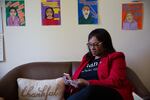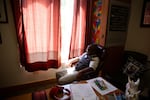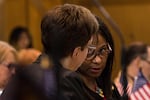Across the country, state legislatures have become more diverse over the past four years. New lawmakers bring different backgrounds and life experiences, and that can lead them to push for more inclusive measures.
In Oregon, Rep. Janelle Bynum, D-Clackamas, is the only African American legislator in the state House.
Last summer, Bynum was canvassing voters in her district when someone — one of her constituents — called the police on her. The encounter ended with Bynum and the officer taking a selfie, but it also attracted national attention.
She ended up winning her seat in one of the state’s most competitive races. The victory put her in a unique position to push for change, and that places an unusual amount of pressure on Bynum, owner of four McDonald’s restaurants and mother of four children, to represent all communities of color.

Rep. Janelle Bynum's office is covered with artwork from students around her district.
Erica Morrison / OPB
OPB’s Erica Morrison spent a day with Bynum recently as she was in the midst of pushing two pieces of legislation: one to address the unlawful summoning of police, the other to ensure that schools and other groups that organize youth sports are doing everything they can to prevent racist behavior. Here are highlights from their conversations:
Erica Morrison: You presented two unique bills yesterday — how did they go?
Rep. Janelle Bynum: They were rough. But members of the committees told me that I had their support and I didn't need to worry about my bills. So it's kind of in their hands, and I look forward to listening to them pass it when the Senate returns to their session.
Morrison: How would you describe the bill about youth sports? I have heard you refer to it as “civility in sports.”
Bynum: The incident that prompted the bill had to do with racism, but as a parent who attends a lot of sporting events ... you can see the breakdown in society where people think it's OK to harass the other team and the opponents. Even in the hearing they talked about it happening at the Little League level ... just the little peewees. So people think it's OK to yell. They think it's OK to make monkey noises. They think it's OK to turn their backs on kids. And as a parent, I send my kids to play, to compete for their joy — their joy, not mine. I want them to learn how to be healthy competitors.
Morrison: And the other bill related to policing?
Bynum: The unlawful summoning bill — that was really, really interesting. It is about protecting protected classes as they exist in our state. A lot of people, because they can't fathom it happening to them or they can't fathom it happening here, they want to talk about other issues. But that to me is like in basketball, like a screen, that's a fake. That's to make you look in another direction without dealing and excavating what is really happening in our society. And I feel the more people try to ignore it, the more emboldened I feel to talk about it.
Morrison: That hit more of a personal note for you because of the incident that took place last summer?
Bynum: Yeah, it was personal. But I think when you're presenting a bill, it has to be personal, but also you have to be open to criticism. So I've seen where other legislators have gotten too close to their bills, and it didn't feel right. You kind of want to step in and say, "Hey, it's like being your own lawyer. … This probably something you shouldn't do."
But I do think it is important, because I am the only African American here in the House. It is important that from time to time I express the realities of life from an African American perspective. And that is uniquely different from every other human being in this side of the Capitol. ... So I represent some portion of the African American community, but African Americans exist in this entire state. Therefore, I believe that every legislator has an obligation to respect the things that we say, to respect the things that we experience and to do something about the injustices that we face. That is not my burden entirely.

Powerful figures stand at the entry into Rep. Janelle Bynum's statehouse office in Salem, Ore.
Erica Morrison / OPB
Morrison: Things happen to black people all the time, and people cover the incidents but they don't cover the action that the individual takes afterwards. How are you not allowing that incident to define who you are? Because I'm sure people say, "Oh, that legislator who got the cops called on her?"
Bynum: I didn't just show up here as a legislator who just happened to start walking. I did what I was supposed to do as a child. I was an obedient child. I was a leader as a young woman. I was student body president. I finished an engineering degree in four years with honors. I completed my MBA at the No. 1 school in the country. I'm a business owner. I have 250 employees. People may think, because the first they've heard of me was when I was stopped by the police, but I'm so much more than that incident.
… In some ways, I cringe when people introduce me that way, because that is as a victim, that is as something had happened to me. But that is not who I am. I'm a mother of four children. I'm the wife of Mark. I'm the daughter of James and Clara. I'm so much more than a police stop.
Morrison: I saw you as a mother yesterday.
Bynum: Yeah. Cleaning up after my littles and free-range parenting and showing them what it's like to stand up. I know they won't completely understand what they saw. But my older kids, they do. My oldest daughter was brave yesterday. She applied to be on the youth council for our city. And you know, she may get it, she may not get it. She was expressing her excitement to me, how she dressed up and how she presented herself. And while I was in one of my committees, she texted me and she's like, "Mom, can you review my speech?" … So through osmosis, I think, the kids, they learn empowerment. And if I can give them that, I think I'll win the good mom award for the day and then I'll probably fail the next day by like forgetting to sign the field trip permission slip, which I think I did.
Morrison: I talked to [Bynum’s 10 year-old daughter] Caroline yesterday. I asked her, "What does your mom do?" And she said, "She tries to make everything good for everybody, and she won't do something small. She'll only do something if it impacts a large group of people."
Bynum: Really? Wow. Wow. ... She's my football player, and she's my battle ax, and it's funny. My kids sacrifice. They sacrifice with me being here. I don't get to see them a lot. But the kids, they internalize pieces of it, and they of course derive their own privilege from it. I tell this story about my baby son, Asa: I went to pick him up from daycare and they said, "Asa, your mom's here." And he was like, "That's state Representative Janelle Bynum to you."

Asa Bynum spins around in the chair behind his mother's desk.
Erica Morrison / OPB
Actually while I was in another committee meeting yesterday, my oldest son sends me a message and says, "I want you to understand my conservative values." And he sends me this link, and it's talking something about how conservative African Americans push back on the Democratic agenda or something like that. And I was like, "OK I'll watch it." So I have the full range of political ideologies and interest in my household.
Morrison: You've described yourself as a conservative.
Bynum: I'm fiscally conservative, and that's kind of from a conservation standpoint.
My personal beliefs are that we have abundance in our world, in our country, and it's simply how it's distributed that we are seeing problems with hunger and poverty. We have fruit falling off of trees here, and yet we have people going hungry. And so before I ask you for more, I need to make sure that I'm doing the very best with what you have already given me. For instance, for my customers, if they gave me their last dollar, I cherish that. That's important to me. And it means that I can't necessarily raise my prices 5 or 10 cents, unless I absolutely need to or have a vision for how I'm going to deliver more value to them.
I am also deeply religious. I grew up in the Baptist church, which I think is a little bit of an anomaly here in Oregon. My family's from South Carolina and I grew up in D.C. So I pray and I believe in God and that guides me. I feel pretty traditional in the sense that I want my children to grow up having some sense of togetherness, some responsibility to the family, some belief in a higher power. And my older children go to Catholic school. My husband is Catholic, but I want them to pray before classes. I want them to feel a sense of hope. I think that has grounded me, and it has allowed me to fight through some of the battles that I go through here at work and at home.
Morrison: Talk about being a business owner. What kind of businesses do you own?
Bynum: My husband and I are the owners of four McDonald's restaurants. We've been doing that since 2002. ... It is an interesting arena to battle in. It is hard. Every day is a grind. Business ownership is something I was always interested in, and that's one of the reasons I went and got my MBA. But it is interesting how you have access to capital, which is the hardest thing for people of color. You look at access to capital, you look at how resources are distributed in a city. You look at the freedom that business owners have. It's a 24-hour-a-day job. I mean, my husband was sending me a message also during a committee yesterday asking me about an unemployment claim. So you know, it's nonstop.

State Rep. Janelle Bynum, D-Clackamas, right, speaks with House Speaker Tina Kotek, D-Portland, on the floor of the House at the Capitol in Salem, Ore., Tuesday, April 2, 2019.
Bradley W. Parks / OPB
Morrison: How do you juggle all those things?
Bynum: I offer myself a little bit of grace. I don't sleep a whole lot. But my kids, I just noticed the little things that they say … [my son] believed that people owned big things. And that to me is transformational, right? That you can own something, that you can own a piece of America. I would love to make sure that young women thought that they could own businesses — that are kids of color, that you're rural kid who, maybe their parents didn't go to college, but they could bootstrap it and they could build something from nothing. That's pretty cool.
Morrison: You have all that going on, and you drive two hours every day to the Legislature. Why do all this?
Bynum: My mother, who is a minister now, she was a teacher for 30 years — a teacher and counselor. When she was encouraging me to run and through our conversations, she said, "Good is the man that leaveth an inheritance for his children's children." And of course we insert woman into that now, but it means that I'm not working for my children. I'm working for my children's children … .
Rep. [Tawna] Sanchez, who is a Native American, she and I were talking about this and I said, "You know, we think of like two generations. That's biblically where we get that from." And she says, "In the Native American culture, we think of seven." And she and I totally vibed on that. So it's not about today, it's about generations forward.
"And so we sit under the shade of trees planted long before us" is a quote from somewhere I don't remember. So I'm planting trees, providing shade. I'm developing capital — social, economic capital for generations ahead.
This story is part of Sharing America Profiles — a series about women of color doing local work that highlights an issue of national importance. Erica Morrison is part of the public-radio collaborative Sharing America, covering the intersection of race, identity and culture.
This initiative, funded by the Corporation for Public Broadcasting, includes reporters in Hartford, St. Louis, Kansas City, and Portland, Oregon. Follow Erica @EwMorrison.

Sharing America: A Public Radio Collaboration
Erica Morrison is part of the public radio collaborative “Sharing America,” covering the intersection of race, identity and culture. This new initiative, funded by the Corporation for Public Broadcasting, includes reporters in the Northwest and Hartford, Connecticut, St. Louis and Kansas City. You can find more "Sharing America" coverage here.
